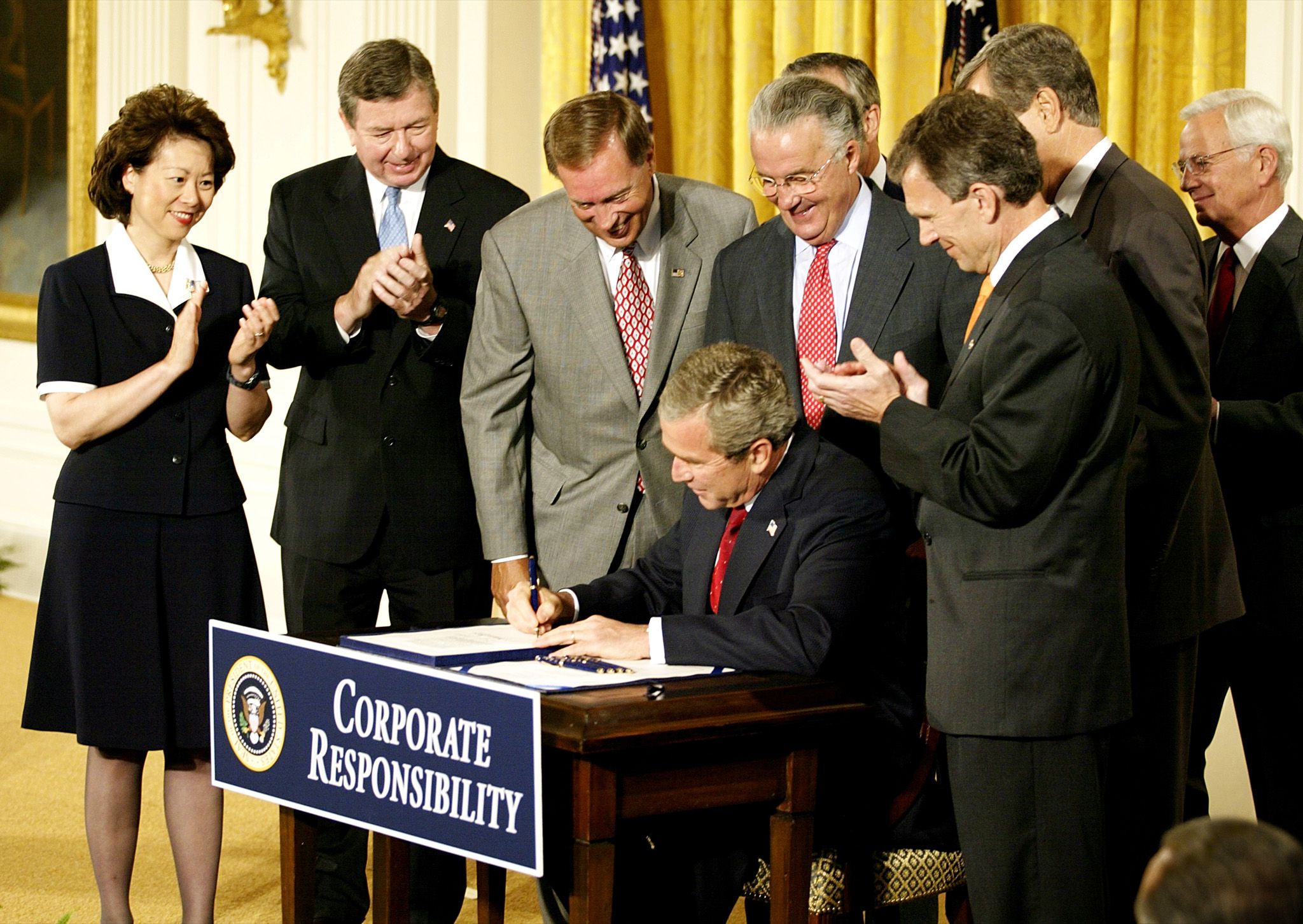“Political Protest Is Not a White Collar Crime”
On July 30, 2002, President George W.

Bush signed the Sarbanes-Oxley Act, a post-Enron law “aimed at fraud in corporations,” as summed up in a headline in the New York Times.
The newspaper elaborated:
The bill, an extensive overhaul of corporate fraud, securities and accounting laws, creates a regulatory board with investigative and enforcement powers to oversee the accounting industry and punish corrupt auditors. It also establishes new standards for prosecuting wrongdoing and gives corporate whistle-blowers broad new protections. Executives who deliberately defrauded investors would face long prison terms.
Did you know that this same bill crafted to stop white-collar-crime is being used as a big stick felony charge against January 6 protestors?
I refer to the provision of the law against “obstruction of an official proceeding.” It’s a crime, the DOJ website tells us, which carries “a maximum sentence of 20 years in prison, fine of $250,000 or twice the monetary gain or loss of the offense.”
The financial penalty — that fine of $250,000 “or twice the monetary gain or loss of the offense” — really gives it all away. That is, the crime this law is meant to prohibit is inextricably connected to financial activity, not political protest.
This provision already has an infamous and unjust past.
Perhaps its very first application was by mad-dog-prosecutor Andrew Weissman, who was able to convince a jury to convict and thus bankrupt the accounting firm Arthur Andersen for its business-as-usual, internal-policy-perfect destruction of Enron documents in the period before the company ever received a subpoena.
The Supreme Court overruled the lower court verdict, 9-0.
Now the misbegotten provision is being totally and willfully misapplied to political protest.
Indeed, in President Bush’s brief remarks on signing the bill twenty years ago, he singled out this one section of the lengthy law to reassure the American people that it would not be used to infringe on the People’s right to protest.
As Bush put it:
To ensure that no infringement on the constitutional right to petition the Government for redress of grievances occurs in the enforcement of section 1512(c) of title 18 of the U.S. Code, enacted by section 1102 of the Act, which among other things prohibits corruptly influencing any official proceeding, the executive branch shall construe the term “corruptly” in section 1512(c)(2) as requiring proof of a criminal state of mind on the part of the defendant.
It’s well worth remembering that the right to petition the Government for redress of grievance, as attorney Joseph D. McBride explains, was continually exercised across the country for much of the year 2020 during the George Floyds protests which preceded the January 6 protest.
“January 6 did not happen in a vacuum,” McBride recently told the Blaze’s Daniel Horowitz. “In the year or so that preceded January 6, you had all the BLM and Antifa riots all over the United States of America. We saw the burning down of cities, the attacking of police officers. Members of antifa out there in black bloc covered head to toe in full riot gear going at it with police, the looting of stores—you name it, we saw it.”
As reported by Deborah Heine in American Greatness:
McBride posited that the left-wing agitators got a pass in 2020 because of new and expanded definitions of “civil disobedience, and political protest” which allowed government entities to view even violent riots “as grounded in the First Amendment, not criminality.
In the wake of this, he explained, the pro-Trump protesters showed up in Washington, D.C. on January 6 with the impression there was this “new and modern definition of political protest.” Of course, most of the January 6 rioters came nowhere near the levels of violence the nation saw during the George Floyd riots, McBride was careful to point out.
Because of who they were, however, (that is, mainly white, middle-class, patriotic, pro-Trump Americans) they were targeted, persecuted, and not given the constitutional protections the much more violent and destructive left-wing rioters were routinely given, he argued.
“For the first time in U.S. history, the political party in power is hunting down and jailing members of the opposition party for political dissidence, and not only that, they’re torturing them in jail,” McBride said. “This is the stuff of dictatorships.”
It is also the stuff of dictatorships to twist the law, hold show trials, and criminalize the state of mind of the political opposition.
Read the full article at the original website
References:
- https://www.justice.gov/usao-dc/pr/two-men-plead-guilty-felony-charge-actions-during-jan-6-capitol-breach
- https://www.licensedtolie.com/
- https://redstate.com/shipwreckedcrew/2020/08/17/the-time-andrew-weissmann-was-reversed-9-0-by-scotus-and-70000-people-still-lost-their-jobs-n251429
- https://www.presidency.ucsb.edu/documents/statement-signing-the-sarbanes-oxley-act-2002
- https://amgreatness.com/2022/08/28/lawyer-january-6-clients-are-being-tortured/
